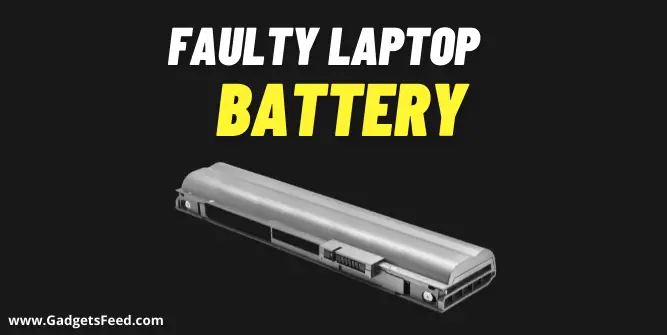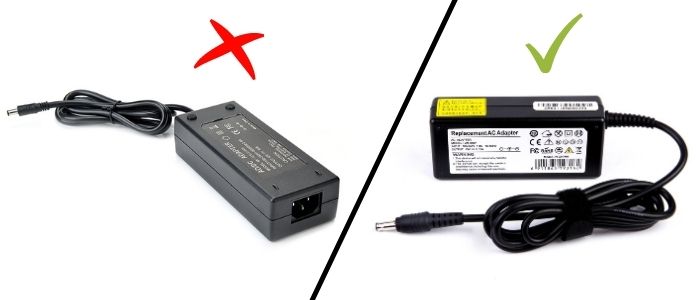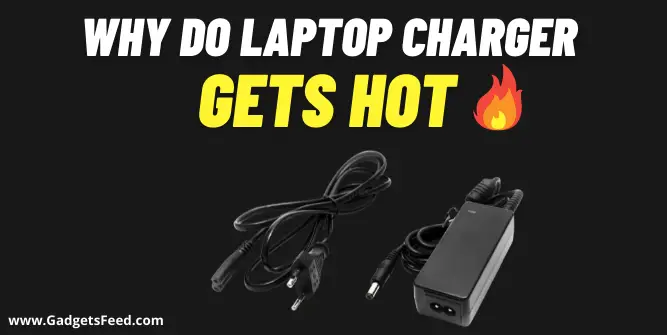When a laptop charger gets hot, it’s because it’s transferring an electrical charge from one location to another. However, the main issue occurs when the laptop charger is burning, and you can’t even touch it for a few seconds, so Why Do Laptop Charger Gets Hot?
The fault is with the block between the plug (which goes into the electrical outlet) and the adaptor (which goes into the computer). That block serves as a transformer.
When the outlet sends an electrical current to it, the voltage is changed to match the laptop’s requirements. The voltage transformation creates heat, causing the transformer and plug to become warm.
Why Is My Laptop Charger So Hot?
Your laptop charger can become hot due to heavy usage or worn out components. If it persists, unplug it and let it cool down. If the problem continues, consider replacing the charger to prevent damage or safety hazards.
If your laptop is always performing at its best, you shouldn’t be surprised if it has a hot charger. To fulfill its demands, your laptop must draw the maximum feasible power.
Look to see whether your charger is still charging your laptop battery when it begins to get too hot. If it isn’t, or if it’s constantly switching between charging and not charging, you most likely have an overheating power adapter.
Note: If you see broken cord or hear any sound from the charger, then immediately disconnect it from your laptop and just replace it
Examine the power adapter for any indications of smoke or unusual noises coming from within it. If you discover anything, unplug it immediately and replace it.
Is It Normal For Laptop Charger To Get Hot
First and foremost, let me assure you that it is perfectly common for laptop chargers to become hot. In fact, most laptop users have encountered this problem. However, it is critical to recognize when heat is normal and when it becomes a concern.
Generally, laptop chargers become hot as a result of the energy conversion from AC to DC. This process produces heat, which is why the charger feels warm. There is no need to be concerned as long as the temperature is not excessively hot to touch or inflicting any damage. However, if your charger becomes too hot to handle, or if there are other symptoms of damage such as frayed wires or discolouration, it’s time to replace it.
5 Reasons Why Laptop Chargers Get Hot
There are numerous causes for the adaptor to become excessively hot, which we shall examine in this post. The following are some of the reasons why laptop charger gets hot:
- Faulty Laptop Battery
- Using Wrong Laptop Battery
- Using Wrong Laptop Charger
- Damaged/Faulty Laptop Charger
- Environment Is Too Hot
1) Faulty Laptop Battery

The battery on your laptop may be worn out, and it needs to be replaced. If your laptop charger operates hard to push electricity through the damaged battery cells, it’s probably overheating.
If your laptop is having battery problems, we recommend you change it as soon as possible.
Read Also: Fix MSI Laptop Battery Light Blinking Red
2) Using the Wrong Laptop Battery
You may be using the wrong laptop battery for your laptop, which might be contributing to overheating problems. A battery doesn’t need to fit into the designated battery slot on your laptop for it to work.
For example, your laptop battery accepts a 19.5V charge, but your laptop battery charger is rated at 17.5 volts.
Batteries of the same form and size have varying power and current ratings, much like power adapters. If you’re charging a laptop battery with a voltage of 19.5V while your laptop battery charger is designed for 17.5V, your charger may overheat.
To discover exactly what kind of battery your laptop requires, visit the manufacturer’s website for the information you can also check this article model number of your laptop to find your laptop model number.
Read Also: How to Find HP Laptop Battery Model Number
3) Using the Wrong Laptop Charger

If you’re using the wrong power adaptor to charge your laptop, this is most likely the case.
It’s critical to get the correct power adapter for your laptop, one that has the correct voltage and current ratings. A little bit over or under the recommended parameters may cause irreversible damage to your laptop.
For example, if your laptop requires a 60-watt charger and you’re using a 30-watt power adapter, it’s possible that it’s overheating. It simply can’t deliver enough electricity and overheats as a result.
You can locate substitute power adapters if you search your laptop make and model followed by “adapter.” If possible, buy one directly from the manufacturer.
Check this for finding the Right Charger For My Laptop
4) Damaged/Faulty Laptop Charger
This is the most frequent cause of a laptop battery charger overheating. A damaged or faulty charger might be overheating itself without your knowledge, and you’d never know it was terrible until it caused irreversible damage to your laptop.
If you purchased an off-brand power adapter for your laptop, we would strongly advise that you toss it and purchase a new manufacturer-approved power adapter.
If you still have your original laptop charger, be sure it’s the same type as the one that came with it. Look for wear and tear on the power cord and all connection points.
If any rips or tears are present, it would be a good idea to get them fixed. There’s no telling when two exposed wires might touch and cause a fire.
You May Like:
How to Find the Right Charger for my MacBook
How to Know the Pin Size of Laptop Charger
How to Find the Right Charger for my Dell Laptop
How to Find the Right Charger for my HP Laptop
5) Environment Is Too Hot

This is one of the most likely reasons that 80% of individuals would not consider, Your room may be simply too hot, and the charger is overheating as a result.
Another frequent scenario we’ve encountered is individuals suffocating their laptops beneath or among the blankets while they sleep. As a result, the charger will not benefit from cooling via the air, and it will certainly overheat.
Keep your charger cool and well-ventilated, or do some experimenting with a metal bowl of water placed on top of the charger, which will help to lower the temperature on scorching days.
FAQ( Why Do Laptop Charger Gets Hot)
Is it bad if my laptop charger gets hot?
When you connect your laptop charger and switch it on, it gets heated up. When charging your laptop while using it, an adaptor that is only partially warmed is normal.
How do I stop my laptop charger from overheating?
1)Keep the Adapter Away From Radiators. The first step is to ensure that the laptop adapter is in a cool location.
2)Switching to Power Saver to reduce PC performance.
3)Remove the laptop’s battery.
4)Unplug the adapter every once in a while.
Why does my laptop charger get hot so fast?
If the adapter is extremely hot, it’s probably because your laptop battery is faulty, you’re using the incorrect charger, or you have a faulty or damaged laptop charger. It’s also possible that the weather is simply too hot.
Does charging overnight cause a fire?
No, but when misused, they can. However, if batteries are overcharged, short-circuited, submerged in water, or damaged, they can start a fire. It’s important to charge them correctly.
Is it bad if my gaming laptop charger gets hot?
It’s normal for gaming laptop chargers to get hot, but it can be a sign of potential issues. If the heat is excessive, it may indicate a problem with the charger or the laptop. It’s best to monitor the temperature and seek professional assistance if necessary to prevent any damage.
Conclusion
Finally, understanding why laptop chargers get hot is critical to preserving the longevity of both your charger and your laptop. Overheating can cause a variety of issues, ranging from reduced battery life to total laptop failure. You may reduce the risk of overheating and extend the life of your charger by following the suggestions and instructions mentioned in this blog post.
Have you ever had a hot laptop charger? What precautions did you take to avoid overheating? Please share your tricks and tips in the comments section below!

Hi, I’m Michael Davis, the owner and writer of GadgetsFeed.com. This website is where I share my knowledge and passion for tech, laptops, and computers. I’m a software engineer by profession, and I enjoy testing and reviewing various gadgets and technologies. I started GadgetsFeed.com to help others find easy solutions for their laptop, computer, and tech problems.
